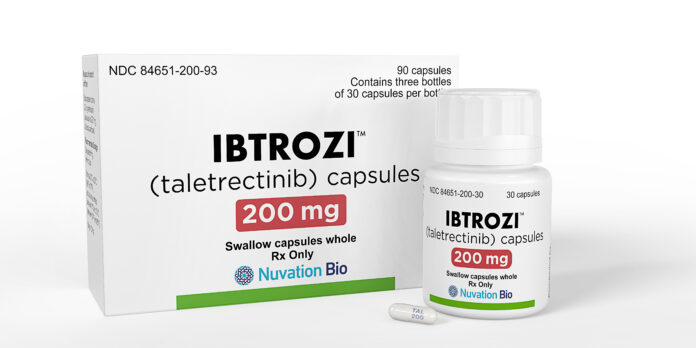New York, NY — The U.S. Food and Drug Administration (FDA) has approved IBTROZI™ (taletrectinib), a next-generation oral treatment developed by Nuvation Bio, for adults with locally advanced or metastatic ROS1-positive non-small cell lung cancer (NSCLC). The approval follows a Priority Review and is backed by extensive data from the global TRUST clinical program.
IBTROZI is a highly selective ROS1 tyrosine kinase inhibitor (TKI) designed to address key challenges in treating ROS1-positive NSCLC, a rare and aggressive cancer type affecting about 3,000 patients annually in the U.S. The disease often strikes younger individuals, many of whom have never smoked, and is frequently complicated by brain metastases.
The TRUST-I and TRUST-II clinical studies—encompassing over 300 patients—demonstrated high and durable response rates across both TKI-naïve and TKI-pretreated populations. In TKI-naïve patients, confirmed overall response rates (cORR) reached 90% in TRUST-I and 85% in TRUST-II. Among those previously treated with other TKIs, cORR was 52% and 62%, respectively. Responses proved durable, with some ongoing for over 40 months.
Significantly, IBTROZI also showed strong efficacy in penetrating the brain, achieving intracranial responses in 73% of TKI-naïve patients and 63% of TKI-pretreated patients with measurable brain metastases.
“IBTROZI’s approval represents a major advance for patients with advanced ROS1-positive lung cancer, particularly those battling disease progression in the brain,” said Dr. David Hung, Founder and CEO of Nuvation Bio. “Its potent efficacy and favorable safety profile make it a compelling option for first-line and subsequent-line treatment.”
IBTROZI is administered as a once-daily 600 mg oral dose, with a long half-life of approximately 66 hours, enabling consistent systemic and central nervous system exposure. Side effects were generally mild and manageable. The most common included diarrhea (64%), nausea (47%), vomiting (43%), and dizziness (22%). Serious side effects were rare, and treatment discontinuation due to adverse events occurred in just 7% of patients.
Nathan Pennell, M.D., Ph.D., a study investigator and lung cancer specialist at the Cleveland Clinic, called IBTROZI “a promising new option” that addresses a critical gap in treatment for ROS1-positive NSCLC. He noted its ability to offer durable responses and control brain metastases with manageable safety risks.
Patient advocacy groups also welcomed the approval. “This is a meaningful step forward for the ROS1+ community,” said Janet Freeman-Daily, co-founder of The ROS1ders. “Having a new, targeted treatment provides real hope for patients and families facing this challenging diagnosis.”
With approvals now in both the U.S. and China and additional regulatory submissions underway, Nuvation Bio aims to expand access to IBTROZI worldwide.


